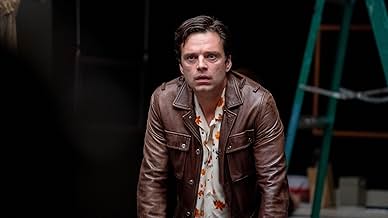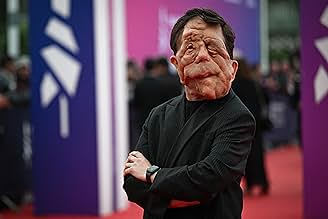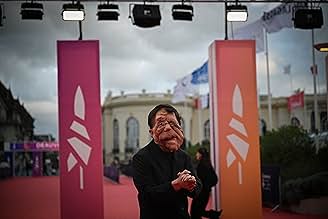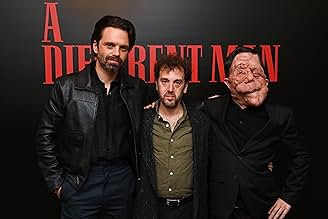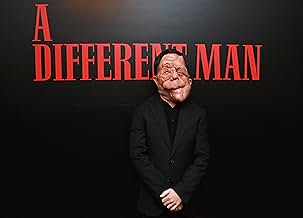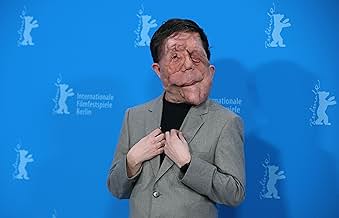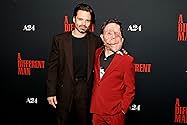Edward, dopo essersi sottoposto a un intervento di ricostruzione facciale, si fissa su un attore di uno spettacolo teatrale basato sulla sua vita precedente.Edward, dopo essersi sottoposto a un intervento di ricostruzione facciale, si fissa su un attore di uno spettacolo teatrale basato sulla sua vita precedente.Edward, dopo essersi sottoposto a un intervento di ricostruzione facciale, si fissa su un attore di uno spettacolo teatrale basato sulla sua vita precedente.
- Candidato a 1 Oscar
- 10 vittorie e 60 candidature totali
Corey R. Taylor
- Luther
- (as Corey Taylor)
Recensioni in evidenza
"A Different Man," directed by Aaron Schimberg, sets out to explore the unsettling relationship between identity, appearance, and self-acceptance, taking the audience on a strange and, at times, uncomfortable journey through the illusions we create to feel accepted. With a style that flirts with dark humor and existential drama, the film stands out for its peculiar approach and the way it subverts expectations, refusing to deliver a redemptive or simplistic narrative. Sebastian Stan, known for his roles in blockbusters, once again steps out of his comfort zone and takes on a role that demands not only a physical transformation but also a deep dive into a character full of contradictions and vulnerabilities.
Stan plays Edward, a man with a severe facial disfigurement who dreams of becoming an actor, but whose lack of talent is as evident as his insecurity. The story gains strength by presenting Edward not as a stereotype of perseverance or inspiration, but as someone genuinely flawed-pathetic even-whose pursuit of aesthetic change is born from misguided ambition and repressed vanity. Schimberg's script succeeds in portraying Edward in a raw, unfiltered way, without resorting to easy sentimentalism. And Stan, even buried under layers of prosthetic makeup, delivers a sensitive and nuanced performance, capturing the essence of a man torn between the desire to be accepted and the inability to accept himself.
Visually, the film evokes a retro charm, with Super 16mm cinematography giving it a grainy texture and a nostalgic color palette reminiscent of urban dramas from past decades. The dense atmosphere of New York, with its worn-out streets and claustrophobic apartments, adds to the protagonist's sense of isolation and displacement. The visual style complements the subtly absurd tone of the narrative, which at times feels reminiscent of early Woody Allen films, with snappy dialogue and tragicomic situations that shift between the melancholic and the ridiculous.
The dynamic between Edward and Ingrid, played by the charismatic Renate Reinsve, adds an interesting layer to the story. Ingrid is a Norwegian playwright who moves into Edward's building with grand ambitions but carries her own insecurities as well. Reinsve delivers a magnetic performance, balancing her character's charm with a latent selfishness that keeps the audience constantly guessing about her true intentions. Their relationship unfolds in unexpected ways, oscillating between companionship and opportunism, revealing how both feed off each other's vulnerabilities.
The story takes a major turn when Edward, after undergoing a radical surgery that makes him "conventionally attractive," decides to reinvent himself as Guy, a real estate agent. This is where the film delves even deeper into the idea that appearance is just a superficial layer of identity. Even free of his old face, Edward still carries the same timid gestures, the same almost childlike insecurity, and Stan, with precise body language, brilliantly conveys this continuity. One of the film's standout scenes is an awkward encounter in a bar bathroom, where despite his new look, he still feels out of place and inadequate.
The introduction of Oswald (Adam Pearson) expands the discussion on identity and self-perception. Pearson delivers a captivating and charismatic performance, providing a stark contrast to Edward's character. Oswald, who has the same facial condition Edward once had, is confident, magnetic, and genuinely comfortable in his own skin-something Edward never managed to be. Oswald's presence acts almost like an inverted mirror, an unsettling reminder that the transformation Edward sought might never have been purely external. The chemistry between Stan and Pearson is one of the film's highlights, with dialogues filled with tension and a competitive energy, as Edward sees in Oswald everything he wished to be but never could.
The soundtrack adds an extra layer of irony and melancholy to the film, punctuating Edward's journey with tones that swing between dramatic and tongue-in-cheek. The music never underestimates the audience, suggesting complex emotions without forcing them, reinforcing the film's ambiguous tone, which never fully commits to drama or humor.
Overall, "A Different Man" doesn't offer easy answers or comfortable resolutions. The takeaway is that external transformation might change how others see us, but it doesn't necessarily alter how we see ourselves. Schimberg navigates this reflection with intelligence and a touch of provocation, questioning what truly defines our identity and how desperately we seek external validation. It's a film that unsettles, entertains, and, above all, makes you think-without ever falling into clichés or simplistic solutions.
Stan plays Edward, a man with a severe facial disfigurement who dreams of becoming an actor, but whose lack of talent is as evident as his insecurity. The story gains strength by presenting Edward not as a stereotype of perseverance or inspiration, but as someone genuinely flawed-pathetic even-whose pursuit of aesthetic change is born from misguided ambition and repressed vanity. Schimberg's script succeeds in portraying Edward in a raw, unfiltered way, without resorting to easy sentimentalism. And Stan, even buried under layers of prosthetic makeup, delivers a sensitive and nuanced performance, capturing the essence of a man torn between the desire to be accepted and the inability to accept himself.
Visually, the film evokes a retro charm, with Super 16mm cinematography giving it a grainy texture and a nostalgic color palette reminiscent of urban dramas from past decades. The dense atmosphere of New York, with its worn-out streets and claustrophobic apartments, adds to the protagonist's sense of isolation and displacement. The visual style complements the subtly absurd tone of the narrative, which at times feels reminiscent of early Woody Allen films, with snappy dialogue and tragicomic situations that shift between the melancholic and the ridiculous.
The dynamic between Edward and Ingrid, played by the charismatic Renate Reinsve, adds an interesting layer to the story. Ingrid is a Norwegian playwright who moves into Edward's building with grand ambitions but carries her own insecurities as well. Reinsve delivers a magnetic performance, balancing her character's charm with a latent selfishness that keeps the audience constantly guessing about her true intentions. Their relationship unfolds in unexpected ways, oscillating between companionship and opportunism, revealing how both feed off each other's vulnerabilities.
The story takes a major turn when Edward, after undergoing a radical surgery that makes him "conventionally attractive," decides to reinvent himself as Guy, a real estate agent. This is where the film delves even deeper into the idea that appearance is just a superficial layer of identity. Even free of his old face, Edward still carries the same timid gestures, the same almost childlike insecurity, and Stan, with precise body language, brilliantly conveys this continuity. One of the film's standout scenes is an awkward encounter in a bar bathroom, where despite his new look, he still feels out of place and inadequate.
The introduction of Oswald (Adam Pearson) expands the discussion on identity and self-perception. Pearson delivers a captivating and charismatic performance, providing a stark contrast to Edward's character. Oswald, who has the same facial condition Edward once had, is confident, magnetic, and genuinely comfortable in his own skin-something Edward never managed to be. Oswald's presence acts almost like an inverted mirror, an unsettling reminder that the transformation Edward sought might never have been purely external. The chemistry between Stan and Pearson is one of the film's highlights, with dialogues filled with tension and a competitive energy, as Edward sees in Oswald everything he wished to be but never could.
The soundtrack adds an extra layer of irony and melancholy to the film, punctuating Edward's journey with tones that swing between dramatic and tongue-in-cheek. The music never underestimates the audience, suggesting complex emotions without forcing them, reinforcing the film's ambiguous tone, which never fully commits to drama or humor.
Overall, "A Different Man" doesn't offer easy answers or comfortable resolutions. The takeaway is that external transformation might change how others see us, but it doesn't necessarily alter how we see ourselves. Schimberg navigates this reflection with intelligence and a touch of provocation, questioning what truly defines our identity and how desperately we seek external validation. It's a film that unsettles, entertains, and, above all, makes you think-without ever falling into clichés or simplistic solutions.
I was not sure when to laugh or look pensive while watching A Different Man but I went with the audience and laughed when they did and thought when they did. Although I'm not sure I agree we should have laughed when we did because the story is of identity crisis above anything else. In this film, a man with facial deformities assumes another life after a successful surgery but is overwhelmed by what his new life is failing to give him and what the old life in hindsight gave him. It's a surreal experience where you will end up thinking about your own life should given a chance to change it and reborn as a new man. A Different Man shows that changing to another person looks good but it's the case of grass is greener on the other side. Sebastian Stan is adorable here.
(Watched at the 2024 MAMI Mumbai Film Festival.)
(Watched at the 2024 MAMI Mumbai Film Festival.)
Kudos to Sebastian Stan for committing 100% to a deeply flawed character living through a very complex situation, and for giving an intensely physical performance.
I wish I could say I liked the movie more than I did. It's a compelling premise and gets even more so once the actor Adam Pearson makes his appearance (Pearson also gives a wonderful performance, by the way). But I felt every minute of this film. It's not long, but it feels like it is. It overstayed its welcome for me by a good fifteen minutes or so.
But I liked the central question the movie asks of its main character -- where's the line between being unfairly held back by societal constructs because of our disadvantages vs. Voluntarily opting in to being a victim? Stan's character does some pretty reprehensible things by the time the movie is over, but your heart can't help but go out to the guy.
Grade: B.
I wish I could say I liked the movie more than I did. It's a compelling premise and gets even more so once the actor Adam Pearson makes his appearance (Pearson also gives a wonderful performance, by the way). But I felt every minute of this film. It's not long, but it feels like it is. It overstayed its welcome for me by a good fifteen minutes or so.
But I liked the central question the movie asks of its main character -- where's the line between being unfairly held back by societal constructs because of our disadvantages vs. Voluntarily opting in to being a victim? Stan's character does some pretty reprehensible things by the time the movie is over, but your heart can't help but go out to the guy.
Grade: B.
Much like Sebastian Stan's character Edward, for many years I was always the person that looked like another person. There was always a caveat of course, where it seemed like the person I supposedly looked like seemed more interesting, outgoing and well known amongst these groups. This parallel with my life and the film instantly drew me in.
It's intriguing this film came out so close to another film centering around identity, that being The Substance. Where the satire and in your face boldness of that film will define its legacy, A Different Man's approach is much more pensive and sad. It reflects the unique challenges of men and women, where women are judged for their outward appearance and sex appeal, while men are judged more for their success and charisma (though sex appeal does play a part in this film). Edward feels held back and embarrassed by his appearance, and fails to see his worth in a society bent on looks and stature. What he doesn't realize is that his inner self is interesting and complex, but he can't harness that power in him. Even when he is conventionally attractive, he is still the same nervous, awkward person. He acts how he thinks he should act in this role, rather than be himself. This is what makes the introduction of Oswald so interesting.
Oswald is aggressive, pushy, and dare I say diabolical. While his outward features should be a setback in his life, his confident and charismatic personality makes him the perfect foil for Edward. He is powerful in ways that Edward can only pretend to be, pushing him out of a play about his own life, stealing his love interest and earning the love and admiration that Edward felt deprived of. Edward is so weak and overwhelmed that he once again tries to pretend to be something he is not on top of his false persona. Edward never truly accepted his true self, and it eventually leads to some troublesome outcomes for him.
I definitely think this film is going to hit a lot of men quite hard, the reviewer included. With all of the discussions about what is masculinity or what even defines a man, it's difficult being our true selves due to the fear of being judged by mythical standards. Is the fact I never went to war not make me a man? Is the fact I am overweight and broken make me less than a man? People forget the pressures men feel in modern society, and we just turn off and sometimes disappear into the woodwork. Suicide and death are approached subjects in this film, and much like in reality, they are brushed aside.
I was definitely intrigued by this film, for we rarely see true deconstructions of the male psyche where the character doesn't do a complete 180 on their life and become a confident Casanova or something, or saves the day like every man wishes they can do. The reality is, most of us just exist and hope things turn out for the best. I did wish the movie had addressed the elephant in the room, which was trying to portray a story about a physically handicapped person without making them a victim. I think they expertly dealt with that subject with some meta commentary at the end. I don't think they wanted that subject to overrun the story, but they at least addressed the issue. In retrospect, they handled it as best as they could.
It's intriguing this film came out so close to another film centering around identity, that being The Substance. Where the satire and in your face boldness of that film will define its legacy, A Different Man's approach is much more pensive and sad. It reflects the unique challenges of men and women, where women are judged for their outward appearance and sex appeal, while men are judged more for their success and charisma (though sex appeal does play a part in this film). Edward feels held back and embarrassed by his appearance, and fails to see his worth in a society bent on looks and stature. What he doesn't realize is that his inner self is interesting and complex, but he can't harness that power in him. Even when he is conventionally attractive, he is still the same nervous, awkward person. He acts how he thinks he should act in this role, rather than be himself. This is what makes the introduction of Oswald so interesting.
Oswald is aggressive, pushy, and dare I say diabolical. While his outward features should be a setback in his life, his confident and charismatic personality makes him the perfect foil for Edward. He is powerful in ways that Edward can only pretend to be, pushing him out of a play about his own life, stealing his love interest and earning the love and admiration that Edward felt deprived of. Edward is so weak and overwhelmed that he once again tries to pretend to be something he is not on top of his false persona. Edward never truly accepted his true self, and it eventually leads to some troublesome outcomes for him.
I definitely think this film is going to hit a lot of men quite hard, the reviewer included. With all of the discussions about what is masculinity or what even defines a man, it's difficult being our true selves due to the fear of being judged by mythical standards. Is the fact I never went to war not make me a man? Is the fact I am overweight and broken make me less than a man? People forget the pressures men feel in modern society, and we just turn off and sometimes disappear into the woodwork. Suicide and death are approached subjects in this film, and much like in reality, they are brushed aside.
I was definitely intrigued by this film, for we rarely see true deconstructions of the male psyche where the character doesn't do a complete 180 on their life and become a confident Casanova or something, or saves the day like every man wishes they can do. The reality is, most of us just exist and hope things turn out for the best. I did wish the movie had addressed the elephant in the room, which was trying to portray a story about a physically handicapped person without making them a victim. I think they expertly dealt with that subject with some meta commentary at the end. I don't think they wanted that subject to overrun the story, but they at least addressed the issue. In retrospect, they handled it as best as they could.
I enjoyed A Different Man, but it fell a little bit short of my expectations because there was so much hype surrounding it. It was good, a very A24 type movie, but not the kind of movie I'll be revisiting very often.
Sebastian Stan is great, but I never admire an actor who has the task of playing a bad actor. He manages to pull it off well, while also doing some solid acting aside from that. Renate Reinsve also had the unfortunate task of playing an unlikeable character, which just seems to be her resume, but again she did well. It's hard to actually rate Adam Pearson as he is such a unique actor and the role was a little bit overbearing, but I certainly enjoyed his performance.
The story felt a little like Adaptation. (2002) at times and even a bit like The Shout (1978). I'm not quite sure how I feel about it on the whole yet, as the ending was somewhat interoperative. It's a movie that will take some digestion so my rating may change later.
Sebastian Stan is great, but I never admire an actor who has the task of playing a bad actor. He manages to pull it off well, while also doing some solid acting aside from that. Renate Reinsve also had the unfortunate task of playing an unlikeable character, which just seems to be her resume, but again she did well. It's hard to actually rate Adam Pearson as he is such a unique actor and the role was a little bit overbearing, but I certainly enjoyed his performance.
The story felt a little like Adaptation. (2002) at times and even a bit like The Shout (1978). I'm not quite sure how I feel about it on the whole yet, as the ending was somewhat interoperative. It's a movie that will take some digestion so my rating may change later.
Lo sapevi?
- QuizThe picture of Edward and his mother on Edward's apartment wall is an actual picture of Sebastian Stan and his mother.
- ConnessioniFeatures Cirano di Bergerac (1950)
- Colonne sonoreOld Time Cat-O'-Nine
Written by The Lord Invador (as Rupert Grant)
Performed by The Lord Invador (as Lord Invader)
Courtesy of Shanachie Entertainment
License by Arrangement with Fine Gold Music
I più visti
Accedi per valutare e creare un elenco di titoli salvati per ottenere consigli personalizzati
- How long is A Different Man?Powered by Alexa
Dettagli
- Data di uscita
- Paese di origine
- Lingua
- Celebre anche come
- Un hombre diferente
- Luoghi delle riprese
- Aziende produttrici
- Vedi altri crediti dell’azienda su IMDbPro
Botteghino
- Lordo Stati Uniti e Canada
- 654.254 USD
- Fine settimana di apertura Stati Uniti e Canada
- 49.466 USD
- 22 set 2024
- Lordo in tutto il mondo
- 1.510.108 USD
- Tempo di esecuzione1 ora 52 minuti
- Colore
- Proporzioni
- 1.85 : 1
Contribuisci a questa pagina
Suggerisci una modifica o aggiungi i contenuti mancanti

Divario superiore
What is the Canadian French language plot outline for A Different Man (2024)?
Rispondi




